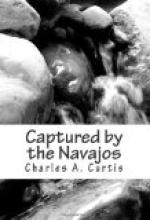The road proved generally smooth, but there were occasional long stretches over which it was impossible to drive faster than a walk. About four in the afternoon we reached Hole-in-the-Plain, and found nothing but a few hundred square yards of thin mud. The fierce rays of the sun had nearly evaporated every vestige of the recent rainfall, and in twenty-four hours more the mud would be baked earth.
Vic, consumed with thirst and suffering in the extreme heat, waded into the mud and rolled in it until she was the color of a fresh adobe, and was, in consequence, made to ride thereafter in disgrace on the driver’s foot-board.
We had intended to pass the night at the Hole, but want of water compelled us to move on. Very gloomy and doubtful of the outcome, we left the Hole-in-the-Plain. We were toiling slowly up a slope, nearly a dozen miles on this third stage of the desert route, when a horseman overtook us, who proved to be Mr. Gray. He slowed up, listened to my account of our perplexities, and after saying many hopeful and cheering things, telling us that Tyson’s Wells were now not far ahead, he galloped swiftly away in the darkness.
At midnight the road ascended to a considerably higher level and became suddenly hard and smooth. The driver urged the team into a series of brief and spasmodic trots, which lasted a couple of hours, when we again descended to a lower level, where the wearily slow gait was resumed. With the slower pace our spirits fell and our thirst increased. As Private Tom Clary expressed it to the driver:
“In a place like this a gallon of Black Tanks water would be acciptible without a strainer, and no reflictions passed upon the wigglers.”
“That’s so, Tom,” called Henry, from the depths of his blankets; “I could drink two quarts of it—half and half.”
“Half and half—what do you mean?” I asked.
“Half water and half wigglers,” was the answer.
“I thought you were asleep.”
“Can’t sleep, sir; I’m too thirsty. Did drop off once for two or three minutes, and dreamed of rivers, waterfalls, springs, and wells that I could not reach.”
“I’ve not slept at all,” said Frank; “just been thinking whether I ever rode over a mile in Vermont without crossing a brook or passing a watering-trough.”
“It’s beginning to grow light in the east,” observed the driver. “By the time we reach the top of the next roll we can see whether we are near the Wells.”
“You may stop the team, Marr,” said I; “we will wait for the escort to close up.”
We got out to stretch our legs, while the straggling soldiers slowly overtook us. The man on the wounded bronco did not arrive until the edge of the sun peeped above the horizon, and I ordered him to remove the saddle and bridle, hitch the animal behind the ambulance, and take a seat beside the driver.
Just when we were about to start again, Frank asked permission to run ahead with the field-glass to the rising ground and look for Tyson’s Wells. I consented, and told him to signal us if he saw them, and that if he did not we would halt, turn out, and send the least worn of the escort ahead for relief.




